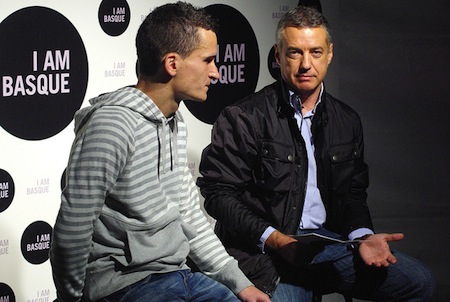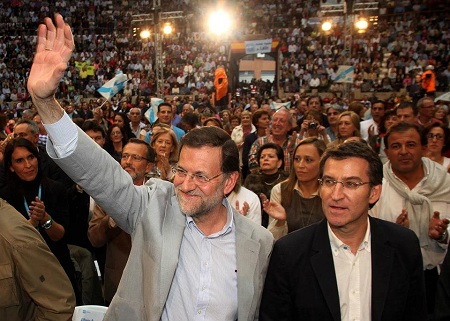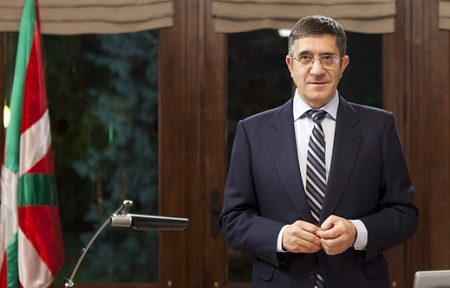

In addition to Galicia, Euskadi (i.e., the Basque Country) will hold regional elections on Sunday — and the chief question is which of the two major nationalist groups will win the largest plurality of the vote. 

As with Galicia, polls in Euskadi have been relative stable since elections were called last month, and the top two parties have been the longstanding nationalist Partido Nacionalista Vasco (the Basque Nationalist Party or the EAJ-PNV — in Basque, the Euzko Alderdi Jeltzalea), and the largest and most organized leftist Basque nationalist coalition to contest regional elections, a group of ezker abertzalea, or “patriotic left,” joined together as Euskal Herria Bildu (EHB).
The latest polls show that the Basque Nationalists would win 33.3% of the vote, amounting to between 24 and 26 seats in the 75-member Eusko Legebiltzarra (the Basque parliament) while the abertzale would win 24.5% and around 20 seats, although some polls have shown an even closer race between the two.
As such, it is expected that either the two nationalist groups will form the next governing coalition in Euskadi or, alternatively, the largest party in the Basque parliament will form a minority government, relying on external support from other parties.
The emergence of a unified abertzale is the most fundamental shift in the election from past elections, and the election will follow one day after the one-year anniversary of the ceasefire signed by the ETA (Euskadi Ta Askatasuna), ending the armed leftist/nationalist struggle against the Spanish government. For many years, radical leftist nationalist parties were actually banned from participation in Spanish elections because of actual or potential ties to the ETA — the largest party in the coalition, Sortu, which formed in 2011, was allowed to participate in elections by Spain’s Constitutional Court only in June 2012.
The current leader of the Basque Nationalists, Íñigo Urkullu (pictured above, top), certainly seems the favorite to become lehendakari (president) of Euskadi. The former party leader in Biscay, the traditional stronghold of the Basque Nationalists, Urkullu became party leader in 2008, and has served sporadically in the Basque parliament since the 1980s.
The leader of the abertzale coalition is Laura Mintegi (pictured above, bottom), a relative newcomer to Basque politics. Mintegi has been a professor at the University of the Basque Country for the past three decades, and is also a Basque novelist. Mintegi is a native of Navarre, the region neighboring Euskadi with a predominantly Basque-speaking north and a Spanish-speaking south — the union of Navarre, or at least northern Navarre with an independent Euskadi has long been the goal of the abertzale.
Given the tense background to the various nationalist movement, what’s been most striking throughout the campaign is that both leaders have emphasized a relatively calm approach to greater Basque autonomy and/or independence, especially in contrast to the populist and nearly bombastic nationalism that Catalan president Artur Mas has suddenly adopted. In line with the traditional moderation of the Basque Nationalists, Urkullu has not called for Basque independence, but rather for ways to renegotiate a new regional deal with Madrid, and he has spoken in vague ways about the failures of Spanish federalism. Both opposition parties have tried to draw out Urkullu for his post-election plans; although the Basque Nationalists (and the abertzale) seem keen on harnessing the energy of pro-independent Basques who are heartened by the sovereignty movement in Catalunya, Urkullu has been more subdued than coy about potential Basque independence.
For her part, Mintegi is clearly pro-independence, but she and her allies have taken pains to distance their approach from Mas’s — Mintegi has emphasized that any referendum on independence would require widespread Basque political and social consensus and would have to comply with existing legal conventions:
Continue reading Which nationalist party will triumph in Sunday’s Basque Country elections? →
![]()
![]()
![]()
![]()






